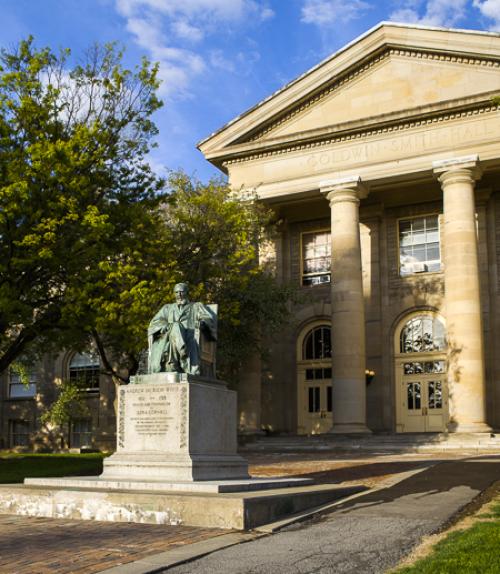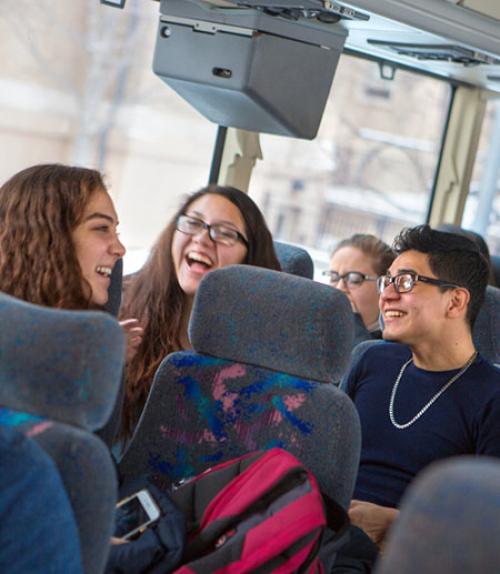For three days every year, members of Cornell’s Posse community meet off-campus with other students, faculty and staff to recharge and dive deep into a topic, usually one on the top of everyone’s minds.
This year’s PossePlus Retreat Feb. 17-19 was no exception, as the 65 people who traveled to a conference center in Painted Post, N.Y. discussed the theme of “Us vs. Them: Division, Community and Identity in American Society.”
The Posse Foundation founded the Posse program in 1989 to identify students from urban high schools with "extraordinary" academic and leadership potential who might have been overlooked by traditional college selection processes. Students are given scholarships to attend college in "posses" of 10. These groups serve as a support community for the students on campus and in their studies.
Cornell’s program began in the fall of 2013, so the first group of scholars are preparing to graduate this spring, making this year’s retreat particularly bittersweet for some of them.
“No matter how many people you do or don’t know at the retreat, by the end of the day, you are closer to all of them,” said Mary Khalaf ’17, one of the original Posse scholars who has attended all four retreats.
While this year’s topic title could have led to a focus solely on the current U.S. political climate, Khalaf said organizers tried to make sure the conversation was broad and included the way our various identities shape us, from race to sexuality to eating preferences to musical tastes to politics.
“The retreat helped you to get to know yourself and understand that you belong in multiple groups,” said Kndeya Gebrewahed ’18, an international student and member of the Men of Color Council who was invited to attend the retreat by friends. “It helped to see where other people are coming from and discover what you might have in common.”
One of the first exercises group members experienced was a game where they were split into different “societies” which had secret rules about the game they were playing. Members visited each other’s societies trying to figure out the rules and find ways they could fit in. Some societies were more open and accepting of others, while other societies had complicated rules for their games and were not welcoming. The narrative around the game was that at one point, everyone had belonged to the same society, but over time, different groups had split off and isolated themselves from each other.
‘It taught us a lot about what it means to be an outsider,” Khalaf said.
Students also brainstormed various “Us. Vs. Them” pairings, including Republicans vs. Democrats, gay vs. straight, black vs. white, etc., which they put together on sheets of paper. By the end of the retreat, those sheets were cut in half and standing alone, which made students realize the validity of each group as its own entity, not only part of a conflicted pair.
“The PossePlus Retreat is a place to explore your individual identity or opinions, but even more so those of communities you interact with,” said Carlo Lindo, Cornell’s Posse Program manager, who works in the Office of Academic Diversity Initiatives. “Whether it be the Cornell community, your familial community or one that is richly tied to an important but maybe invisible part of your individual identity, you are given the space to answer questions you don’t often think to ask. Everyone can benefit from that type of reflection.”
Some of the students who attended wished there could have been a broader representation of views, but thought this year’s political climate made that difficult to accomplish.
“It was a retreat but it was also a venting session of how people thought about their ‘them,’ but there was no ‘them’ there to represent themselves,” said Anthony Halmon ’17. “Given the political climate, how would I, if I supported Trump, come and explain why I did if everyone else here is saying why I shouldn’t have supported Trump. Look what he’s doing to different people and individuals. Even if I had a pro-business perspective, I wouldn’t feel safe in that space because everyone else is condemning him right now.”
The PossePlus retreats often spur students to return to campus and start new groups or become more involved in activism.
“It inspired me to be a better person, to try my best to learn from different people,” said Tredarin Crumbley ’18, a member of the second Posse cohort. “The idea is that through the retreat we move from ‘us vs. them’ to creating a bigger ‘us.’ “




